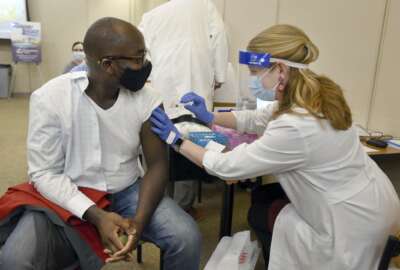
Some federal workers in DC could be getting COVID-19 vaccines soon
In today's Federal Newscast, the District of Columbia will open up vaccine eligibility to essential employees at federal agencies in the area starting April 12th.
To listen to the Federal Newscast on your phone or mobile device, subscribe in PodcastOne or Apple Podcasts. The best listening experience on desktop can be found using Chrome, Firefox or Safari.
- Certain D.C. federal workers will be able to get in line for a COVID-19 vaccine within the next few weeks. The District of Columbia will open up vaccine eligibility to essential employees at federal agencies in the area starting April 12. D.C. Mayor Muriel Bowser said an essential worker is anyone who has to report to work in person and can’t telework. The Office of Personnel Management estimates roughly 141,000 federal employees work in the District, though not all of them are essential.
- Members of Congress say they feel like they’ve been working in a war zone since January 6th. That’s about to change. The fencing and razor wire that’s surrounded the Capitol for the past two months will start to come down by the end of this month. That’s according to a new memo to lawmakers from the acting House Sergeant at Arms. Fences will be moved closer to the Capitol later this week. That’ll still leave an “inner perimeter” of barriers to the buildings, but it will end several of the vehicle and pedestrian closures security officials put in place after the initial attack. (Federal News Network)
- The Coast Guard is warning members to get paper copies of their service health treatment records, especially if they are about to leave the Coast Guard. Because of the pandemic, the National Archives and Records Administration stopped digitizing Coast Guard health records a year ago. It’s not taking in new ones. Therefore the Coast Guard is unable to upload records to the Veteran Affairs Department systems. The Guard said this is significant for service members about to leave. So it’s telling coastguardsmen to obtain their own copies so they’ll have something to show VA when the time comes.
- The Defense Department is deploying another group of active duty personnel to help administer COVID-19 vaccines. The latest team is headed to Detroit, where about 200 servicemembers from the Air Force will help run a community vaccination center at Ford Field. The Pentagon said it’s deployed about 2,700 medical personnel so far to help at similar sites. So far, they’ve delivered around 700,000 shots at those mass vaccination sites.
- Military spouses may soon have an easier time getting occupational licenses moved from state to state. Military spousal unemployment is high and part of the reason for that is because service members’ partners need to get recertified in their jobs every time they move. The Defense Department is now offering grants that will allow professional groups and the Council of State Governments to work together on legislation to allow reciprocity between states on licenses. The grant is open to teaching, social work, cosmetology, massage therapy and dentistry and dental hygiene. About 15% of military spouses move across state lines each year.
- About 700,000 Air and Space Force employees will see improved IT experiences starting this summer. The Air Force is embarking on Wave 1 of its enterprise-IT-as-a-Service upgrade, which will give users an improved and consolidated service desk and catalog. Airmen and guardians will see faster login times and higher functioning devices. Devices will include automated compliance checks and improved troubleshooting as well.
- Labor received its second loan under the Technology Modernization Fund. The Labor Department is receiving a $9.6 million loan from the Technology Modernization Fund to upgrade its enterprise data platform. The board announced its first award of fiscal 2021 on March 12. With the loan, Labor plans to improve availability and accessibility of its data to developers, journalists, researchers and other agencies. The board said this funding also will help mission areas deploy resources more effectively by gaining greater access to the department’s enterprise data sources, creating data management capacity and ensuring timely delivery of information to staff and customers in a secure manner.
- House Oversight and Reform Committee Chairwoman Carolyn Maloney (D-N.Y.) wants to update a 40-year-old presidential records law. She introduced the Presidential Records Preservation Act. The bill would require the president, vice president and senior White House officials to make and preserve certain official records. It also calls on the White House to manage and preserve presidential electronic records in a way that’s more easily searchable and accessible. She introduced the bill on the first day of Sunshine Week. (Federal News Network)
- Top members of the Senate Judiciary Committee are looking into the impact the COVID-19 pandemic has had on agencies responding to Freedom of Information Act requests. Senators Chuck Grassley (R-Iowa), Dick Durbin (D-Ohio), John Cornyn (R-Texas) and Patrick Leahy (D-Conn.) asked the Government Accountability Office to review agency FOIA backlogs, and the turnaround time for agencies to complete requests. The senators also asked GAO to flag any operational efficiencies agencies might have adopted with employees working remotely.
- A contact tracing program for employees and contractors at the Department of Homeland Security is in the works. DHS employees will use the department’s existing IT help desk platform to inform their supervisors of a positive COVID-19 result. Contact tracers will follow up with employees to learn about their last visit to a DHS facility and who they may have exposed. Contact tracers will then call exposed employees. DHS said this program will help the department safely bring more employees back to work and slow the spread of COVID-19 in their facilities.
- Federal employees who are victims of last month’s winter storms in Texas now have access to an emergency leave transfer program. Federal employees can donate unused annual leave to their colleagues affected by either one of those recent disasters. Impacted employees must apply through their agencies to receive donated leave. It’s up to each agency to figure out who needs additional leave and who has leave to donate. The Office of Personnel Management said it will help coordinate the transfer of leave among federal agencies.
- The Veterans Affairs Department filled two key management roles. Secretary Denis McDonough named Tanya Bradsher as the chief of staff and Mike Parrish as the principal executive director in the Office of Acquisition, Logistics and Construction. Bradsher previously served on the National Security Council and as chief of staff for Virginia Democrat Congressman Don Beyer. Parrish will provide policy and oversight for the department’s $36 billion acquisition budget and manage major construction and leasing projects. Previously, he was a professor of practice and senior advisor of systems engineering at the U.S. Military Academy at West Point.
- The IRS collected delinquent taxes at a higher rate from millionaires than lower-income individuals. The recovery rate is only 39% for wealthy individuals behind on their taxes. The IRS still hasn’t collected on more than $2.4 billion in taxes owed from those high-income earners. The Treasury Inspector General said the IRS generally doesn’t make high-income taxpayers a high priority for collections, and that the agency’s caseload exceeds what its staff can handle. The IRS is pushing back on those findings, saying its predictive models focus on recovering the maximum amount of delinquent taxes with limited resources.
Copyright © 2025 Federal News Network. All rights reserved. This website is not intended for users located within the European Economic Area.
Eric White
Eric White is news anchor and Federal Drive producer at Federal News Network.
Follow @FEDERALNEWSCAST





